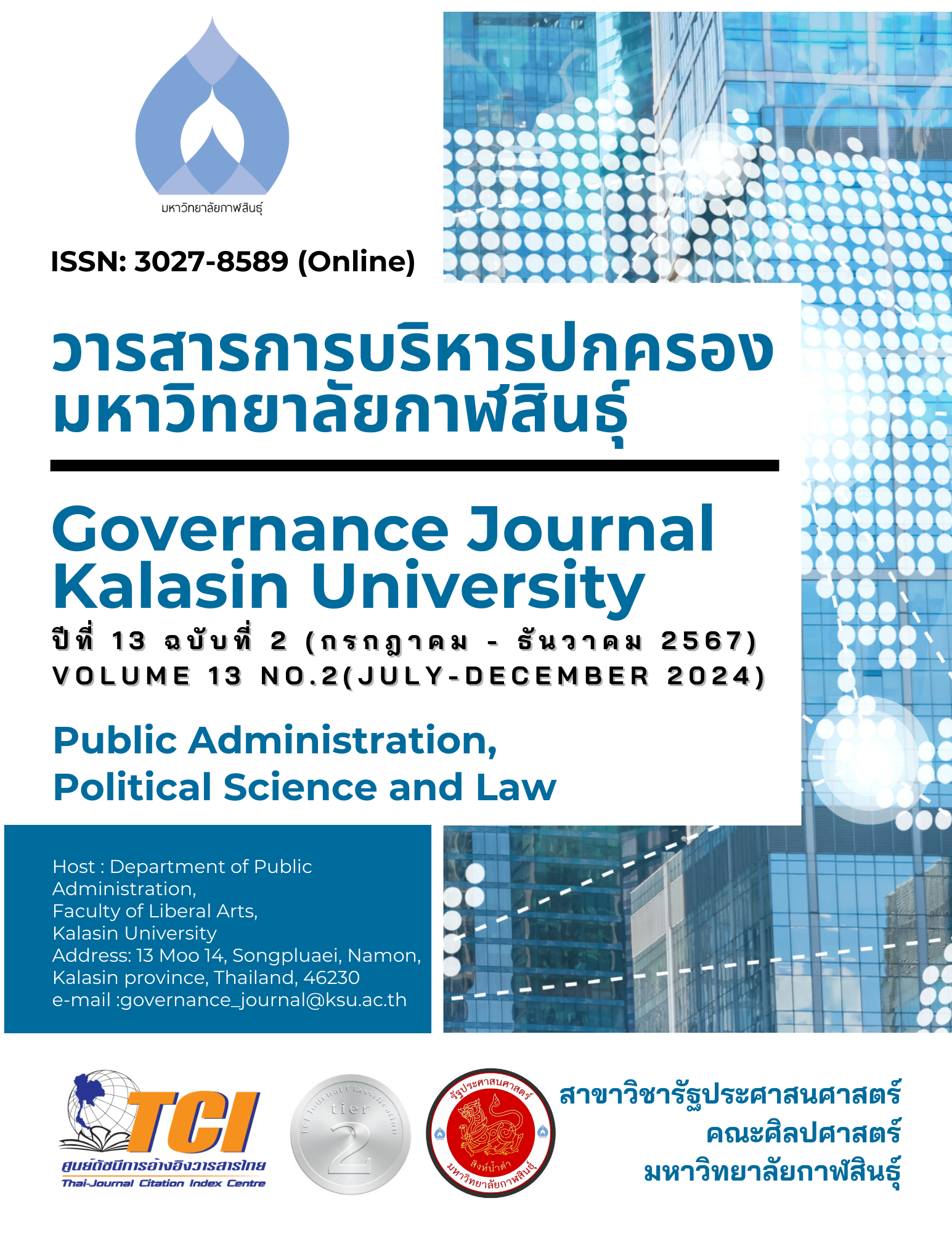The Enhancing community empowerment framework for strengthening the community in NAPA Subdistrict Municipality Mueang Chonburi District Chonburi Province
DOI:
https://doi.org/10.14456/gjl.2024.33Keywords:
Empowerment Framework; Strengthening the Community; Chonburi ProvinceAbstract
The longstanding issue of Na Pa Subdistrict Municipality, as a municipality located within the AMATA NAKON Industrial Estate In the industrial era, people prioritize work over social interactions. The migration of populations and significant cultural differences lead to gaps and a lack of cohesion within communities. The objective of this research is to study the patterns of empowerment to promote community strength within the NAPA Subdistrict Municipality, MUEANGCHONBURI District, CHONBURI Province. The research employs a mixed-method approach, with the sample population consisting of 400 residents of Na Pa Subdistrict Municipality. The key informants and focus group discussions involve 12 participants. The research utilizes questionnaires and interviews as research tools. Data analysis includes frequency, percentage, mean, and content analysis. The research findings reveal that 1) the current state and necessity of empowerment to promote community strength within the Na Pa Subdistrict Municipality show an average preference for desired conditions significantly higher than the current state in all aspects and issues. Overall, it is at a high level. The aspect with the highest demand for empowerment is acceptance, followed by delegation of authority, and the least is training and development. 2) The development of an empowerment framework to promote community strength consists of 1 Vision, 5 Missions, 10 Objectives and 36 Strategies 3) The evaluation of the empowerment framework to promote community strength reveals that it is appropriate, feasible, and beneficial, with an overall high level of suitability. It is deemed practical for implementation.
Downloads
References
ภาษาไทย
กมลศักดิ์ วงศ์ศรีแก้ว จิระพงค์ เรืองกุน และสายใจ ชุนประเสริฐ. (2561). การพัฒนาชุมชนเข้มแข็ง: กรณีศึกษาชุมชนพูนบำเพ็ญ เขตภาษีเจริญ กรุงเทพมหานคร. วารสารการพัฒนาชุมชนและคุณภาพชีวิต, 5(1), 46–57.
โกมินทร์ กุลเวชกิจ. (2558). รูปแบบการเสริมสร้างความเข้มแข็งของชุมชนด้านเศรษฐกิจโดยยึดปรัชญาของเศรษฐกิจพอเพียงบ้านดอนดู่ ต.ป่าสังข์ อ.จตุรพักตรพิมาน จ.ร้อยเอ็ด. ดุษฏีนิพนธ์ปรัชญาดุษฏีบัณฑิต. บัณฑิตวิทยาลัย : มหาวิทยาลัยราชภัฏมหาสารคาม.
นภาภรณ์ หะวานนท์, เพ็ญสิริ จีระเดชากุล และสุรวุฒิ ปัดไธสง. (2560). ทฤษฎีฐานรากในเรื่องความเข้มแข็งของชุมชน. กรุงเทพมหานคร : สำนักงานคณะกรรมการส่งเสริมวิทยาศาสตร์ วิจัยและนวัตกรรม.
พระชลญาณมุนี และเสาร์คำ ใส่แก้ว. (2567). รูปแบบการเสริมสร้างพลังอำนาจ เพื่อส่งเสริมความเข้มแข็งของชุมชน ในเทศบาลตำบลนาป่า อำเภอเมืองชลบุรี จังหวัดชลบุรี. พระนครศรีอยุธยา : สถาบันวิจัยพุทธศาสตร์ มหาวิทยาลัยมหาจุฬาลงกรณราชวิทยาลัย.
พินทุสร โพธิ์อุไร. (2562). แนวคิดว่าด้วยการเสริมพลังชุมชนเพื่อการสร้างเสริมสุขภาพ. วารสารพัฒนาสังคม, 21(2), 64-77.
ภูวไนย สุนา. (2564). การพัฒนารูปแบบความสัมพันธ์โครงสร้างเชิงเส้นของปัจจัยที่มีอิทธิพลต่อการเสริมสร้างพลังอำนาจการทำงานของครูโรงเรียนขยายโอกาสทางการศึกษาในภาคตะวันออกเฉียงเหนือ. ดุษฎีนิพนธ์ศึกษาศาสตรมหาบัณฑิต. บัณฑิตวิทยาลัย: มหาวิทยาลัยราชภัฏสกลนคร.
มิ่งขวัญ คงเจริญ และอาชัญญา รัตนอุบล. (2564). การพัฒนารูปแบบการเสริมสร้างพลังอำนาจของชุมชน เพื่อเสริมสร้างความยั่งยืนของชุมชนแห่งการเรียนรู้, วารสารวิจัย มสด, 7(2). 19-36.
รพีภัทร์ สุขสมเกษม. (2559) ปัจจัยที่มีผลต่อการส่งเสริมความเข้มแข็งของชุมชน กรณีศึกษาชุมชนในเขตเทศบาลนครปากเกร็ด จังหวัดนนทบุรี. กรุงเทพมหานคร : มหาวิทยาลัยธรรมศาสตร์.
วรรณธรรม กาญจนสุวรรณ. (2559). กระบวนการจัดการชุมชนเข้มแข็ง: รูปแบบปัจจัยและตัวชี้วัด. วารสารรัฐประศาสนศาสตร์, 5(2), 119-158.
วิรันทร์ดา เสือจอย. (2564). การเสริมสร้างพลังอำนาจของผู้บริหารกับการปฏิบัติงานตามมาตรฐานวิชาชีพครู ในโรงเรียนสังกัดสำนักงานเขตพื้นที่การศึกษาประถมศึกษาสิงห์บุรี. กรุงเทพมหานคร : มหาวิทยาลัยศิลปากร.
สุวรรณา จันทร์ประเสริฐ และคณะ. (2559). การเสริมสร้างความเข้มแข็งชุมชน. กรุงเทพมหานคร : สำนักสนับสนุนการพัฒนาระบบสุขภาพ.
อรทัย ก๊กผล. (2559). Urbanization เมื่อ “เมือง” กลายเป็นโจทย์ของการบริหารจัดการท้องถิ่นสมัยใหม่. กรุงเทพมหานคร: สถาบันพระปกเกล้า.
อรทัย ปาอ้าย. (2558). รูปแบบการพัฒนาวัฒนธรรมวิจัยตามแนวคิดแบบเสริมสร้างพลังอำนาจในโรงเรียนมัธยมศึกษา. ดุษฎีนิพนธ์ศึกษาศาสตรดุษฎีบัณฑิต. บัณฑิตวิทยาลัย: มหาวิทยาลัยบูรพา.
ภาษาอังกฤษ
Diane Tracy. (1990). 10 steps to empowerment A common-sense guide to managing people. New York : William Morrow and Company.
Translated References
Kamolsak Wongsaikaeo, Jirapong Ruangkun, and Saijai Chunprasert. (2018). Community Development: A Case Study of Phun Bamphen Community, Phasi Charoen District, Bangkok. Community Development and Quality of Life Journal, 5(1), 46–57.
Gomin Gulwechkij. (2015). Economic Strengthening Patterns of Communities Based on the Sufficiency Economy Philosophy: A Case Study of Don Du Community, Pa Sang Sub-district, Chaturaphak Phiman District, Roi Et Province. Doctoral Dissertation in Philosophy (Sufficiency Economy). Graduate School: Mahasarakham Rajabhat University.
Napaphan Havanon, Pensiri Jiradechagun, and Surawut Patthaisong. (2017). Fundamental Principles of Community Empowerment. Bangkok: National Science and Technology Development Agency.
Phra Chalyanamuni and Saokum Saikaew. (2024). Power Enhancement Models for Strengthening Community Empowerment in Napa Forest Municipality, Mueang Chonburi District, Chonburi Province. Phra Nakhon Si Ayutthaya: Buddhist Research Institute, Mahachulalongkornrajavidyalaya University.
Pinthuonsorn Phot-urai. (2019). Community Empowerment Approaches for Health Promotion. Social Development Journal, 21(2), 64-77.
Phuvanai Suna. (2021). Developing a Structural Linear Relationship Model of Factors Influencing the Empowerment of Teachers' Work in Expanding Educational Opportunities in the Northeastern Region. Doctoral Dissertation in Education. Graduate School: Sakon Nakhon Rajabhat University.
Mingkwan Kongcharoen and Achanya Rattanaubon. (2021). Developing a Community Empowerment Model to Enhance the Sustainability of Learning Communities. MSU Journal of Research, 7(2), 19-36.
Rapiiphat Sukhsomkasem. (2016). Factors Influencing Community Empowerment: A Case Study of Communities in Pak Kret Municipality, Nonthaburi Province. Bangkok: Thammasat University.
Wannatham Kanjansuwan. (2016). Community Empowerment Processes: Models, Factors, and Indicators. Journal of Political Science, 5(2), 119-158.
Wirandha Suejoi. (2021). Empowering School Administrators with Professional Standards Implementation in Schools under the Jurisdiction of the Singburi Primary Education Service Area Office. Bangkok: Silpakorn University.
Suwanra Janprasert et al. (2016). Community Strengthening. Bangkok: Health System Development Support Office.
Arotai Kokpon. (2016). Urbanization: When "City" Becomes the Focus of Modern Local Administration Management. Bangkok: Phra Pokklao Institute.
Arotai Paaai. (2015). Cultural Research Development Patterns Based on Empowerment Concepts in Secondary Schools. Doctoral Dissertation in Educational Research. Graduate School: Burapha University.
Diane Tracy. (1990). 10 steps to empowerment A common-sense guide to managing people. New York : William Morrow and Company.
Downloads
Published
How to Cite
Issue
Section
License
Copyright (c) 2024 Governance Journal, Kalasin University

This work is licensed under a Creative Commons Attribution-NonCommercial-NoDerivatives 4.0 International License.








